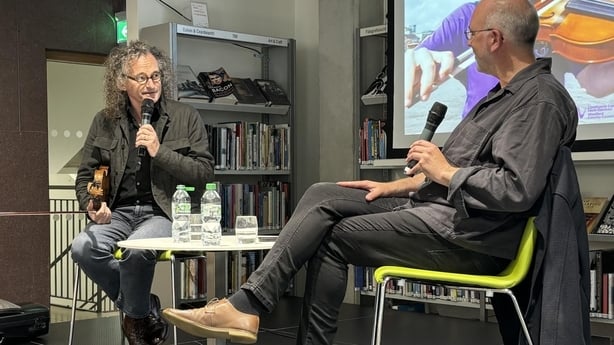Via The Journal Of Music: It is just over thirty years since I paused on my way out of J. McNeill's music shop on Capel Street in Dublin to look at the tapes for sale, writes Toner Quinn.
They were held in a tall, slender wooden case by the door with the most recent at the top. This is where I first came across Kíla’s Handel’s Fantasy as well as the re-release of Kevin Burke’s Sweeney’s Dream. On this day there was just one tape on the top shelf. The cover seemed purposefully blurred to represent motion and presented a musician standing holding the fiddle with the bow hanging from one finger. New tapes were not cheap for a student, but somehow I had precisely the right amount of money. On impulse, having never heard the name of the musician before, I bought it and jumped on the bus to Waterford.
When the tape began in my headphones, the light touch surprised me. No assertive guitar strum before the soloist leaps in, no consortium of musicians to fill in the gaps between the notes; just a slow, focused sense of travel through an unorthodox repertoire. I had listened to it through by the time we reached Carlow and just had one thought in mind: I was curious to hear more.
In Waterford, I put it on for my college flatmate, the melodeon player Brian O’Shea. He stayed quiet while he listened. When it came an exploratory version of the tune I Buried My Wife and Danced on Her Grave, which Brian also played, he smiled to himself but said nothing, and started reading the sleeve notes with intent. Yet there wasn’t much to read; just a list of tune names and a few thank yous. The album became part of our regular listening, even though our traditional music lecturer criticised it in class. Brian was first to hear this musician live, in Kilkenny in 1994, and reported back with a full ten minutes of enthusiasm. I regretted that I had not made the trip too.
In subsequent years, I listened to each release by Martin Hayes, saw him in concert, and when I started the Journal of Music, I began to write about him. After I published an essay titled ‘Martin Hayes and the Tradition’ in 2006, I found myself at the side of the stage at the Willie Clancy Summer School annual fiddle recital in Miltown Malbay and Hayes was there. He raised his hand to me and came over. He was pleased at the detail I went into in the article. It was one of the few times in twenty-five years of writing where an artist came up to me to discuss what I had written about them.

Wexford interview
Over thirty years after buying that tape, I find myself seated in Wexford Town Library at the Fleadh Cheoil beside Hayes. We had met many times since Miltown but somehow never managed an extensive conversation about his own music.
I had been asked to launch Mo Cheol, a collection of tunes by Nóra Byrne Kavanagh, at 6pm, and Hayes had been asked to do a public interview at 4pm. The fact that I was around was fortuitous and I was asked to carry out the interview.
We had very little discussion beforehand. Hayes didn’t realise I would be interviewing him until a few days beforehand, and I had no set plan. Having listened to his music for years I knew I had plenty of questions – thirty years of questions in fact. I asked Martin if I could tape it for my future writing and put the phone on the table between us.
Above is the recording of the interview. Rare for me, when I was travelling back from Wexford late that night, I listened back to the whole interview. I was hearing things that I had not fully appreciated during our conversation. I also began to understand aspects of Hayes’ music that I had not fully understood before, for example, how he creates that particular rhythm and pulse in his playing.
As it happens, just over two weeks later, I was playing at the Masters of Tradition festival in Bantry at the invitation of Martin, and, as part of the festival, he carried out a public conversation with me about my recent book. Not wanting to be conscious of a recording, I decided not to record that conversation, which I slightly regret now, but I am glad that I captured Wexford. I think that of all the conversations Martin and I have had over the years, either brief or extensive, this was the one where we managed to dig deeper into his music. I hope you enjoy it.
Read more from The Journal Of Music here.
Disclaimer: The copyright of this article belongs to the original author. Reposting this article is solely for the purpose of information dissemination and does not constitute any investment advice. If there is any infringement, please contact us immediately. We will make corrections or deletions as necessary. Thank you.






